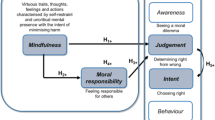Abstract
In this paper I look at attempts to develop forms of consequentialism which do not have a feature considered problematic in Direct Consequentialist theories (that is, those consequentialist theories that apply the criterion of rightness directly in the evaluation of any set of options). The problematic feature in question (which I refer to as ‘evaluative conflict’) is the possibility that, for example, a right motive might lead an agent to perform a wrong act. Theories aiming to avoid this phenomenon must argue that causal relationship entails motives and acts (for example) having the same moral status. I argue that attempts to ensure such ‘evaluative consistency’ are themselves deeply problematic, and that we must therefore accept evaluative conflict.
Similar content being viewed by others
References
Adams, R.M., “Motive Utilitarianism ”, The Journal of Philosophy 73 (1976), pp. 467-481.
Dancy, J., “Parfit and Indirectly Self-Defeating Theories ”, in Jonathan Dancy (ed.), Reading Parfit. Blackwell, 1997, pp. 1–23.
Feldman, F., “On the Consistency of Act – and Motive-Utilitarianism: A Reply to Robert Adams ”, Philosophical Studies 70 (1993), pp. 201–212.
Gruzalski, B., “Parfit's Impact on Utilitarianism, Ethics 96(4) (1986), pp. 760–783.
Hooker, B., Rule Consequentialism, in Edward N. Zalta (ed.), The Stanford Encyclopedia of Philosophy (Spring 2004 edition). URL: http://www.plato.stanford.edu/archives/spr2004/entries/consequentialism-rule.
Kagan, S., “Evaluative Focal Points ”, in Brad Hooker, Elinor Mason and Dale E. Miller (eds.), Morality, Rules and Consequences: A Critical Reader. Edinburgh: University of Edinburgh Press, 2000, pp. 134–155.
Lang, G., “A Dilemma for Objective Act-Utilitarianism ”, Politics, Philosophy and Economics 3 (2004), pp. 221–239.
Mason, E., “Against Blameless Wrongdoing ”, Ethical Theory and Moral Practice 5 (2002), pp. 287–303.
Nagel, Thomas., The View From Nowhere. Oxford: Oxford University Press, 1986.
Parfit, Derek., Reasons and Persons. Oxford: Clarendon Press, 1984.
Pettit, P. and Michael Smith., “Global Consequentialism ”, in Brad Hooker, Elinor Mason and Dale E. Miller (eds.), Morality, Rules and Consequences: A Critical Reader. Edinburgh: University of Edinburgh Press, 2000, pp. 121–133.
Railton, P., “Alienation, Consequentialism, and the Demands of Morality ”, Philosophy and Public Affairs 13(1) (1984), pp. 134–171.
Railton, P., “How Thinking About Character and Utilitarianism Might Lead to Rethinking the Character of Utilitarianism ”, Midwest Studies in Philosophy 13 (1988), pp. 398–416.
Streumer, B., “Can Consequentialism Cover Everything?” Utilitas 15 (2003), pp. 237–247.
Williams, B., “A Critique of Utilitarianism ”, in J. J. C. Smart and Bernard Williams, Utilitarianism: For and Against. Cambridge: Cambridge University Press, 1973.
Author information
Authors and Affiliations
Corresponding author
Rights and permissions
About this article
Cite this article
Louise, J. Right Motive, Wrong Action: Direct Consequentialism and Evaluative Conflict. Ethic Theory Moral Prac 9, 65–85 (2006). https://doi.org/10.1007/s10677-005-9000-8
Received:
Accepted:
Published:
Issue Date:
DOI: https://doi.org/10.1007/s10677-005-9000-8




